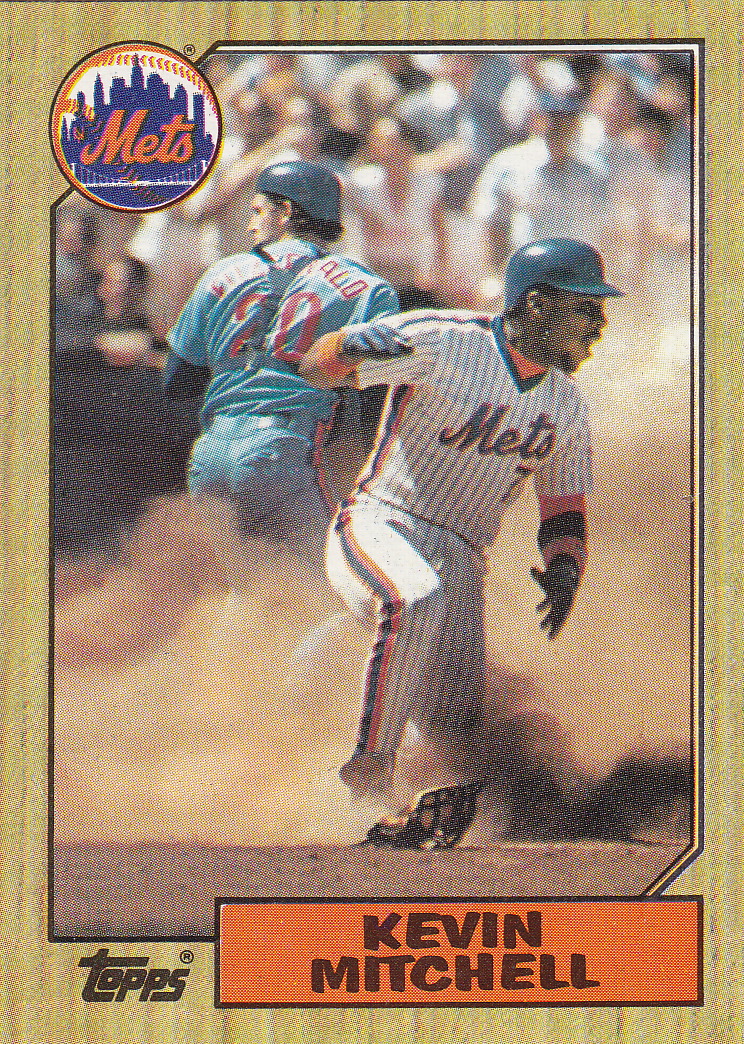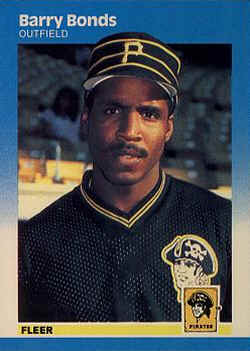I am currently reading and enjoying Jeff Katz's Split Season, a look at the 1981 baseball season and accompanying strike. It's the latest in the genre of "year in baseball history" books, including Dan Epstein's wonderful Stars and Strikes from last year about the 1976 season. If I had the time, resources, and talent, I know exactly what year I would write a baseball book about: 1987.
Of course time, resources, and talent are not things I possess a lot of these days, and instead of writing a book, I guess this blog post will suffice. Hopefully someday someone else with more time, resources, and talent than I can write the book.
The 1987 season is still ingrained in my mind because it was the first season of baseball when I was actually a student of the game. I'd seen plenty of games before, and played the game too, but did not yet understand it on a deeper level. In 1987, at age eleven, I started collecting baseball cards with a single-minded ferocity, and in the process absorbed a lot of statistical knowledge. I watched a lot of Cubs games on WGN and Braves games on TBS that summer, and am still indebted to then Cubs announcer Steve Stone for teaching me some of the finer points of the game. I learned what the different pitches were, the fundamentals of strategy (when to bunt, hit and runs, right vs lefty, etc), and even more advanced stats (for the time) like on base percentage. If I were to write that mythical book, here are a bunch of things that would get a lot of attention:
Mark McGwire and Home Runs
Baseball had gone through a power outage for years by 1987, and pitching, defense, and base-running were consequently highly valued. I never really thought it was possible for hitters to hit a lot of home runs and also for high average, I found the two to be mutually exclusive. I looked back in baseball history at players like Ruth, Gehrig, Aaron, Mays, and Williams and wondered if such feats could ever be repeated. All of a sudden, almost out of nowhere, the home runs just started flying out of the park. Hitters known for slapping singles were suddenly smashing dingers. Wade Boggs had never hit double digit homers in a season, in 1987 he hit 24, a total he would never come close to equalling. A rookie by the name of Mark McGwire came out of nowhere to hit homers at a torrid pace; he slammed 37 before the all-star break. I was convinced that he would break Maris' then almost unbeatable record of 61. It did not come to pass, but both he and Andre Dawson would finish the season with 49 homers, a number that seemed impossible only the year before. I remember reading that the ball had likely been juiced, which almost seems quaint today, when we know that the players were too, including, of course, Mark McGwire. It's interesting to think of a time when he was not the sad man peering behind those grandpa reading glasses at the congressional hearing saying "I'm not here to talk about the past" nor the broad-chested conqueror of the home run record in 1998, a folk hero come to life. In 1987 he was a young rookie with enormous potential, with a story that turned out differently than anyone could have known.
Bo Jackson
Growing up in Nebraska, I was a Kansas City Royals fan, until I betrayed them after my move to Chicago. They won the title in 1985, and had amazing young players like Bret Saberhagen and Bo Jackson in 1987, along with proven veterans like Frank White and George Brett. Little did I know that the team would not see the playoffs again until 2014. While I still idolized Bret, I was in awe of Bo Jackson, like most sports fans of my generation. He could hit monstrous home runs and literally climb the walls to steal doubles and homers from his opponents. He was also still young and remarkably inconsistent in 1987. I still remember him striking out five times in a game that April, because it happened to be the day of my beloved grandfather's funeral. I distinctly remember going to my grandparents' tiny, ramshackle house after the service and wanting to avoid conversation in my state of sadness and mourning. I picked up a copy of the Omaha World Herald lying on the couch, and was briefly distracted by possibility that a major leaguer with Bo's gifts could strike out five times. It only made life seem that much more strange and tragic.
Kevin Gross and Joe Niekro
Baseball Cards
As I said before, I really got into collecting cards in 1987, which happened to be the year when the late 80s baseball card boom really began. I honestly thought I was collecting something that would be highly valuable in later years, only to find out that a box of Topps wax packs now goes for only $12, less than the $14.40 it would have cost in 1987 dollars. That Topps set is a favorite among collectors like myself, although I preferred the Fleer set at the time, mostly because those Fleer cards were unavailable in my podunk hometown.
One Game Playoff
The most compelling pennant race in 1987 came in the AL East, between the Blue Jays and Tigers. Back in those days before the wild card format, teams had to win their division to advance to the postseason. Toronto and Detroit ended the season tied, leading to a one game playoff at the venerable Tiger Stadium. After the grueling rigors of baseball's almost torturous 162 games, the players had to go one more time in a sink or swim situation. The drama doesn't get much better than that. My family went out to the park or something that day, but now just having turned 12 I could opt to stay home and watch this game. I still remember napping for a bit on the couch, then waking up in time for the ninth, and pitcher Frank Tanana driving a stake through the heart of the Blue Jays' season by forcing the memorably named Garth Iorg to hit a weak grounder to the mound that he threw to first for the putout. I remember the ancient and cramped Tiger Stadium looking like it was about to collapse from the bedlam, and thinking that the Tigers were destined to win the Series. Of course, they didn't.
The Twins and the World Series
As a child of the Midwest, the 1987 World Series was particularly sweet, since it included the Cardinals and Twins. As a Royals fan I felt obligated to root against the Cardinals, and in any case, I liked the Twins as an underdog, since they only won a paltry 85 games. They managed to defeat the Detroit juggernaut in only five games. They played in the Metrodome, about the most unbaseball stadium ever, with its low roof and football atmosphere. The fans used the structure to their advantage, making insane levels of noise. On top of that, they waved their homer hankies, creating a sea of white in the stands. They were also not the most athletic team, unlike the fleet footed Cardinals, who boasted speedsters like Vince Coleman and Willie McGee. The Twins had big-butted sluggers like Kent Hrbek and scrappy fireplugs like the great Kirby Puckett. The Twins had plenty of other characters, including relief pitcher Juan Berenguer, responsible for "The Berenguer Boogie," a song that makes the "Super Bowl Shuffle" sound like the Beatles. If there was ever a baseball team that stepped out of a Hollywood movie where a team of lovable slobs finally prevails, this was it.




No comments:
Post a Comment